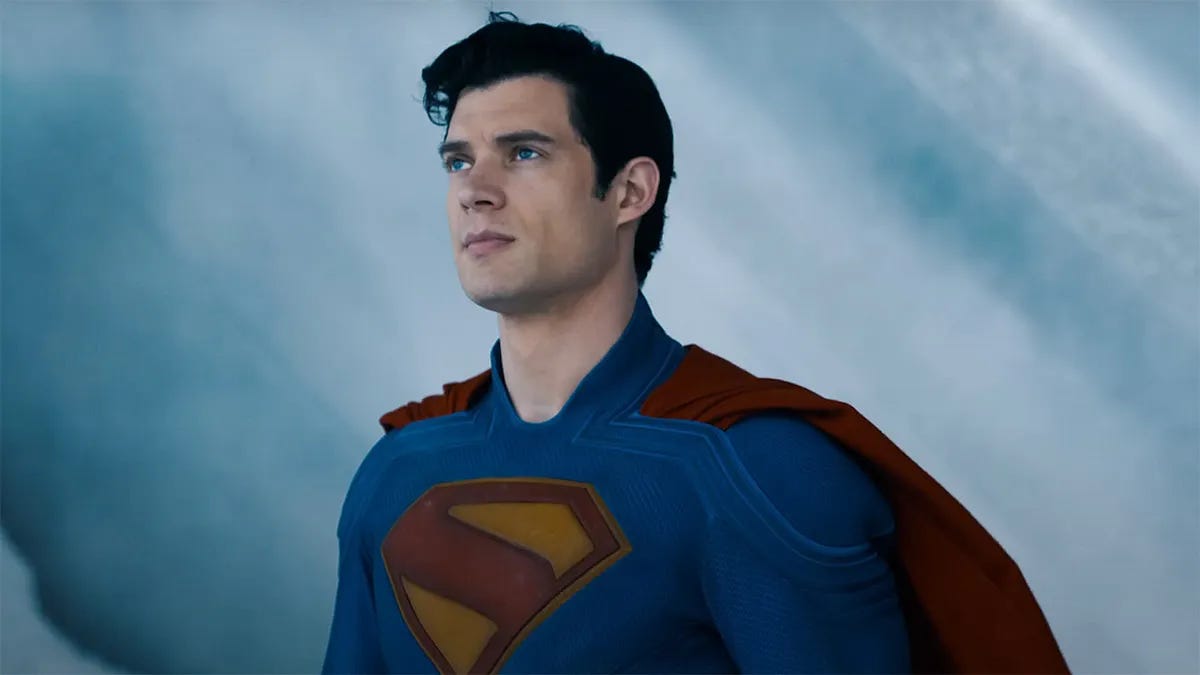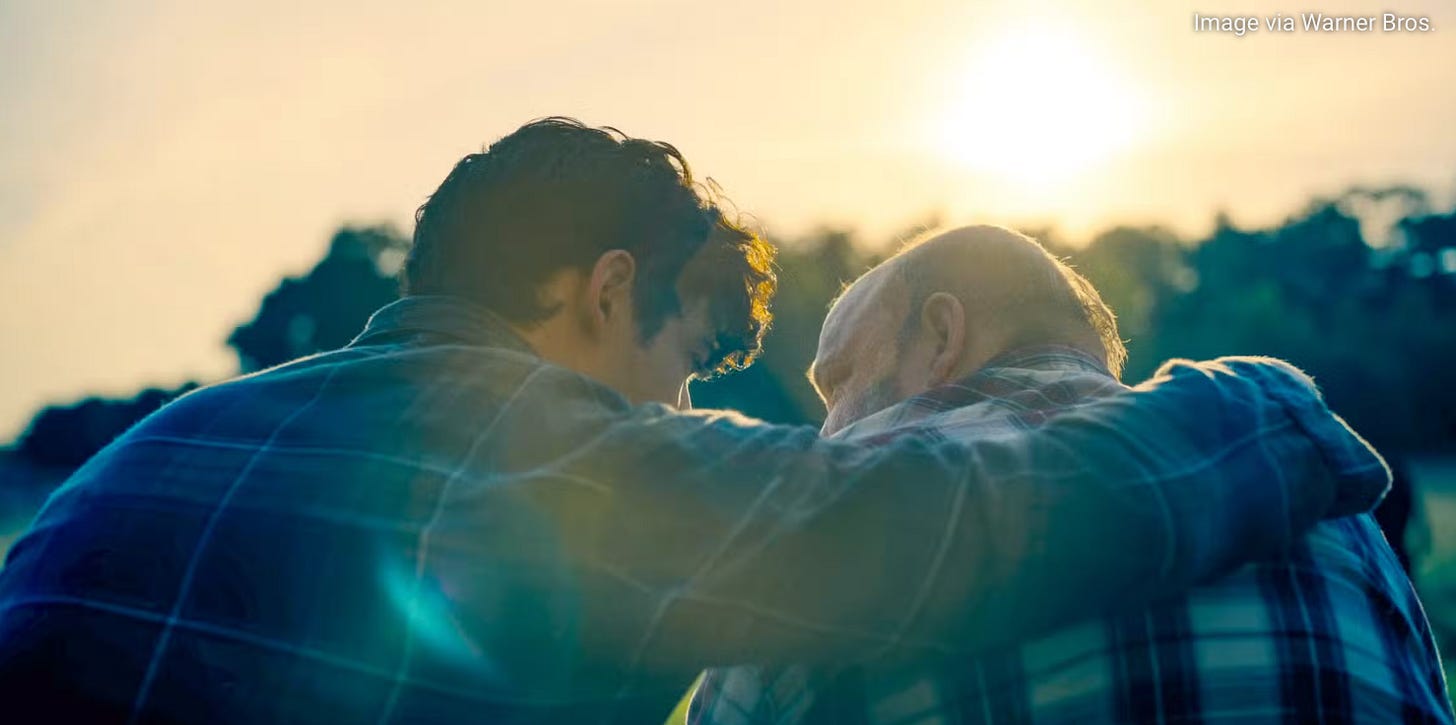Who You Choose To Be
The new Superman is for millennials and Zoomers grappling with complicated legacies
What do you do when the legacy you’ve been handed down turns out to be a lie—or worse, a mandate for domination?
That’s the central question of James Gunn’s new take on Superman. And I think it’s one that’s particularly resonant with the millennials and Zoomers flocking to see the film.
Since their emergence about a hundred years ago, comic book superheroes have become mythological chameleons. What I mean by that is cultural mythologies are reflections of the societies that make them, and for the last century superheroes have held the place of mythological heroes in the Western world. Batman, Spider-man, Superman, these are our Beowulfs, our Achilles, our Gilgameshes.
Given that these superheroes have been around for so long, their stories have been told over and over again, in comic books, on TV, in film, and each retelling becomes a reflection of both the creators and the cultural moment they exist in, a reflection of what matters to us right now, and what conflicts we are grappling with.
The previous big screen iteration of the man from Krypton was Zack Snyder’s Man of Steel. In that version of the DC universe, Snyder presented a grittier, darker, moodier version of the character. Superman is frequently rejected and doubted by humanity, perceived as a walking weapon of mass destruction, and as a result he is full of doubt about his own purpose. Man of Steel is a picture of post 9/11 cynicism, anxiety, and xenophobia.
In contrast, Gunn’s Superman comes at a time when millennials and Zoomers are grappling with a social legacy that is turning to dust in their hands. The promises of the American Dream have proved hollow, our social institutions (religion, government, finance) are fraught with corruption, and climate disaster looms on the horizon. We’re also questioning the picture of ourselves as Americans that’s been handed down by previous generations as we grapple with the histories of slavery, racism, genocide, and xenophobia that are deeply layered into the fabric of our country’s history.
More particularly, many of us who grew up in American evangelicalism in the 80s and 90s have been waking up to the ways in which our faith tradition has long been coopted as a tool for authoritarianism and white supremacy. We’ve had to undergo the grief of realizing that a legacy that gave us the beautiful ideals of Jesus also has a very dark, destructive side.
The new Superman seems built to wrestle with these realities, and in the midst of them it also grapples with the question, is it still possible to choose hope and be a good person?
Legacy
This film particularly hinges on parental legacy. As most of us probably already know, Kal-El/Clark Kent has two sets of parents, his Kryptonian ones who sent him to earth to avoid destruction, and his adoptive parents, Kansas farmers Jonathan and Martha. In most versions of the story, both sets of parents give Superman ideals to live up to: down-to-earth values from his adoptive parents, and messianic ideals from his Kryptonian ones. In both the Christopher Reeve films and Man of Steel, Kal’s father Jor-El sees him as a figure meant to guide humanity closer to the light.
In Gunn’s version however, these dual parents function as dark and light. Based on half of a preserved message sent with him as a child, Superman believes that his Kryptonian parents sent him to earth to do good, but as he and we the audience discover later in the film, their full message communicates that they intended for him to colonize Earth and rule over its weak-minded people. The good-hearted Clark is rightfully distraught, and returns to the Kent farm in Kansas to process this discovery. Here we see where Superman’s character truly comes from in the care and tender-heartedess of his adoptive parents. When Clark laments, “I’m not who I thought I was,” Jonathan replies, “Parents aren't for telling their children who they're supposed to be. We are here to give y'all tools to help you make fools of yourselves all on your own. Your choices. Your actions. That's what makes you who you are.”
Superman, of course, chooses to remain the good, decent person that the Kents raised him to be, and rejects whatever supremacist intentions Jor-El had for him.
Anti-Cynicism
Some people were bothered by Gunn changing Jor-El’s intentions for Kal. For me, as someone who has had to wrestle with what it means to be both American and Christian, this storyline is what made the film so resonant. That, and the portrayal of Superman in the context of the film. David Corenswet’s version of the character possesses Boy Scout levels of decency and kindness which some would say are unrealistic and cheesy, but which I found heartwarming and hopeful. And it’s not like the world portrayed in the film is utopian. Lex Luthor is a narcissistic tech billionaire who meddles in both national and international politics, and traffics in disinformation on social media as a weapon against Superman. Even the other superheroes in the film, the Justice Gang of Guy Gardner, Hawkgirl, and Mr. Terrific are basically just amoral heroes-for-hire.
Gunn’s film portrays Superman’s character and actions as a choice against cynicism. In a great moment toward the end of the film, Superman says to Luthor, “I love, I get scared. I wake up every morning and despite not knowing what to do, I put one foot in front of the other and I try to make the best choices I can. I screw up all the time, but that is being human and that’s my greatest strength.”
Superman isn’t unaware that the world is a dark, often cruel place. It’s just that he’s driven by hope, and the sense that even if the world isn’t good or kind, someone has to be.
And that encourages me to embrace hope and kindness as well.





I appreciated this commentary, Chris. I have to admit that I have never been a fan of comic book movies, although my husband always was. I did go see this one and had a headache for two days afterwards. I guess I wasn’t cut out for all of the noise and special effects. However, I do see exactly what you are saying reflected here. The lines you quoted were probably the two best ones in the movie for me. I just had not quite made the connection that you made. So bravo for youand thank you.